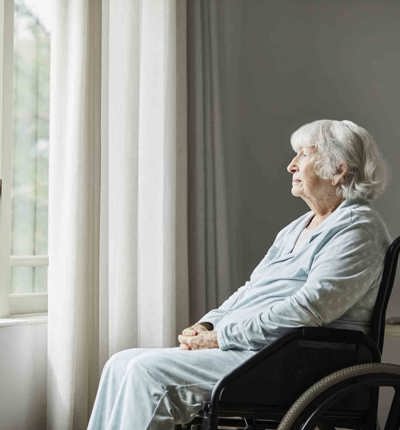
COVID-19 and the impact on care homes
Human rights solicitor Beatrice Morgan discusses the impact of coronavirus on residents in residential care homes and the staff who care for them.
Posted on 24 April 2020
At first, the impact of COVID-19 on those living in care homes seemed to be missing from the national debate. Then the horrifying scale of care home deaths became apparent, and the effect of the pandemic on residents in residential care homes, and the staff who care for them, has moved to the forefront of the national debate.
Care home residents are often dependent on others for personal care, for making sure they have enough to eat and to drink, to protect them from the risk of falling, or to ensure that they receive the right medication at the right time for any underlying health conditions.
Care home residents are often dependent on others for personal care, for making sure they have enough to eat and to drink, to protect them from the risk of falling, or to ensure that they receive the right medication at the right time for any underlying health conditions.
Many of those receiving care are frail either as a result of age or illness. Age UK describes frailty as referring to “a person’s mental and physical resilience, or their ability to bounce back and recover from events like illness and injury”. This means that incidents such as a fall or becoming dehydrated can have a major and long-term impact on the health and wellbeing of a frail person.
As care homes struggle to deal with the coronavirus there have been concerns raised over the risks of a decline in the standard of care provided to residents. In addition to staff shortages there have been reports of patients being discharged from hospital into care homes with suspected or confirmed coronavirus, of residents with symptoms but with no access to testing, and of staff with little or no access to personal protective equipment (PPE).
Social distancing in a care home environment, a place where the residents and staff often spend the majority of the day in communal areas, is near impossible. To attempt to keep several or all residents in isolation, some with severe dementia where their familiarity with routine is vital, is impractical and can result in the carers having less time to meet their basic needs.
Even before the pandemic, many care homes relied on family members to assist their relatives at mealtimes, with personal care or to provide much needed company during the day. Now that visits from family members have been suspended, so has this support.
Local authorities have responsibilities in relation to safeguarding adults. They have a duty to act when there is reasonable cause to suspect that an adult in their area:
- has needs for care and support (whether or not the authority is meeting any of those needs);
- is experiencing, or is at risk of, abuse or neglect, and
- as a result of those needs is unable to protect himself or herself against the abuse or neglect or the risk of it
In rare cases, family members raise concerns about the care that their loved one is receiving. If these relatives can no longer visit, there is a worry that incidents of poor care will go undetected.
As a result of a physical or mental health condition, residents may not themselves be able to communicate to their family or others that something is wrong. Those that were isolated in care homes before this crisis hit are now even further removed from society.
There are thousands of care workers and care home managers across the country working tirelessly to protect their residents the best they can, often whilst putting themselves at risk.
These are extraordinary and challenging times for all who work in social care. Nevertheless, it is vital that the standard of care provided to care home residents is not lowered during this crisis.
If you are concerned about the care provided to a friend or family member resident in a care home, you can seek legal advice. In order to raise a safeguarding alert, contact your local authority’s adult social care team.


